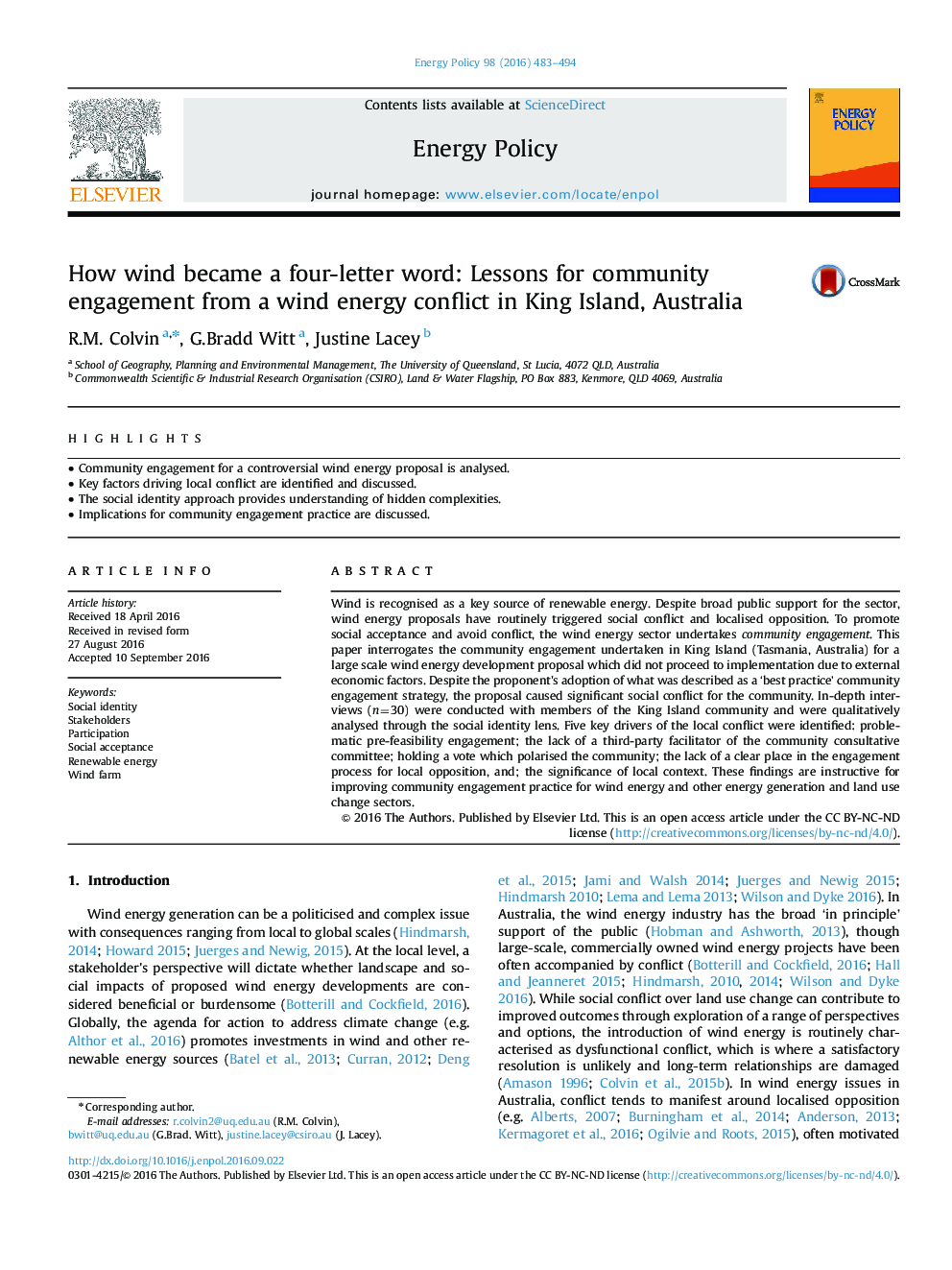| کد مقاله | کد نشریه | سال انتشار | مقاله انگلیسی | نسخه تمام متن |
|---|---|---|---|---|
| 7398406 | 1481260 | 2016 | 12 صفحه PDF | دانلود رایگان |
عنوان انگلیسی مقاله ISI
How wind became a four-letter word: Lessons for community engagement from a wind energy conflict in King Island, Australia
ترجمه فارسی عنوان
چگونه باد یک کلمه چهار حرفی شد: درس هایی برای تعامل با جامعه از یک جنگ انرژی باد در جزیره کینگ، استرالیا
دانلود مقاله + سفارش ترجمه
دانلود مقاله ISI انگلیسی
رایگان برای ایرانیان
کلمات کلیدی
هویت اجتماعی، سهامداران، مشارکت، پذیرش اجتماعی، انرژی تجدید پذیر، مزرعه باد،
ترجمه چکیده
باد به عنوان یک منبع کلیدی انرژی تجدید پذیر شناخته شده است. با وجود پشتیبانی گسترده مردم برای این بخش، پیشنهادات انرژی باد به طور معمول منجر به درگیری های اجتماعی و مخالفت های محلی شده است. بخش انرژی انرژی به منظور ارتقاء پذیرش اجتماعی و اجتناب از تعارض، مشارکت جامعه را تضمین می کند. این مقاله مشارکت اجتماعی در جزیره کینگ (تاسمانی، استرالیا) را برای طرح پیشنهادی توسعه انرژی باد در نظر گرفته است که به دلیل عوامل اقتصادی خارجی ادامه نیافته است. با وجود پذیرش طرفدار از آنچه که به عنوان استراتژی مشارکت اجتماعی بهترین تجربه شناخته شد، این پیشنهاد منجر به تعارض قابل توجه اجتماعی برای جامعه شد. مصاحبه عمیق (30 نفر) با اعضای انجمن جزیره پادشاه انجام شد و از طریق لنز هویت اجتماعی تجزیه و تحلیل کیفی شد. پنج عامل کلیدی درگیری های محلی شناسایی شده است: مشارکت پیش از مشروعیت مشکوک؛ فقدان تسهیل کننده شخص ثالث کمیته مشورتی کمیته؛ برگزاری رأی گیری که جامعه را قطعی می کند؛ فقدان یک مکان مشخص در روند مشارکت برای مخالفان محلی و؛ اهمیت موضوع محلی. این یافته ها برای بهبود مشارکت اجتماعی در زمینه انرژی باد و دیگر بخش های تولید انرژی و استفاده از زمین مفید است.
موضوعات مرتبط
مهندسی و علوم پایه
مهندسی انرژی
مهندسی انرژی و فناوری های برق
چکیده انگلیسی
Wind is recognised as a key source of renewable energy. Despite broad public support for the sector, wind energy proposals have routinely triggered social conflict and localised opposition. To promote social acceptance and avoid conflict, the wind energy sector undertakes community engagement. This paper interrogates the community engagement undertaken in King Island (Tasmania, Australia) for a large scale wind energy development proposal which did not proceed to implementation due to external economic factors. Despite the proponent's adoption of what was described as a 'best practice' community engagement strategy, the proposal caused significant social conflict for the community. In-depth interviews (n=30) were conducted with members of the King Island community and were qualitatively analysed through the social identity lens. Five key drivers of the local conflict were identified: problematic pre-feasibility engagement; the lack of a third-party facilitator of the community consultative committee; holding a vote which polarised the community; the lack of a clear place in the engagement process for local opposition, and; the significance of local context. These findings are instructive for improving community engagement practice for wind energy and other energy generation and land use change sectors.
ناشر
Database: Elsevier - ScienceDirect (ساینس دایرکت)
Journal: Energy Policy - Volume 98, November 2016, Pages 483-494
Journal: Energy Policy - Volume 98, November 2016, Pages 483-494
نویسندگان
R.M. Colvin, G.Bradd Witt, Justine Lacey,
